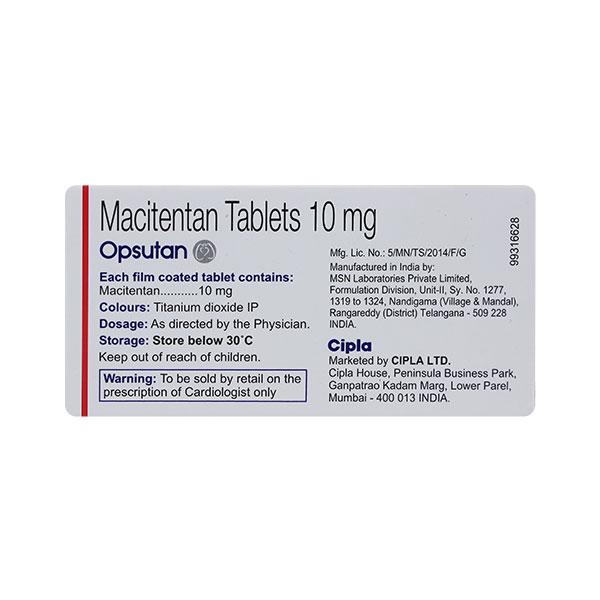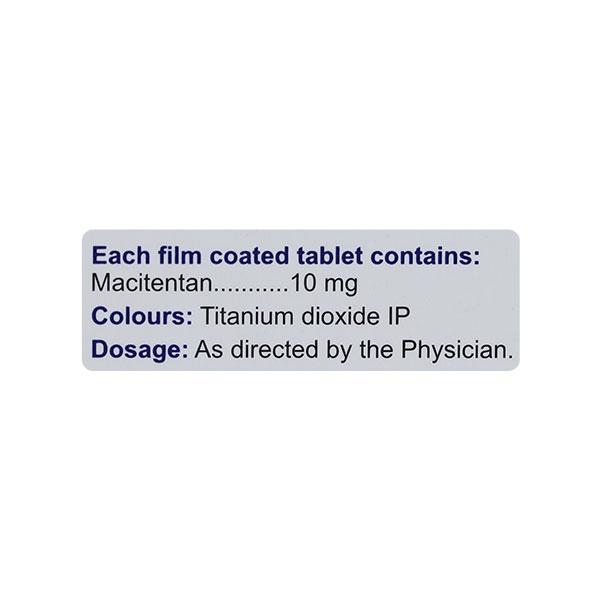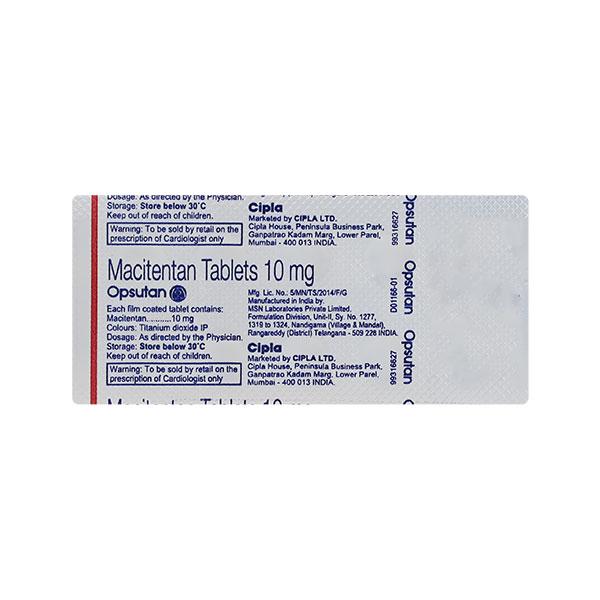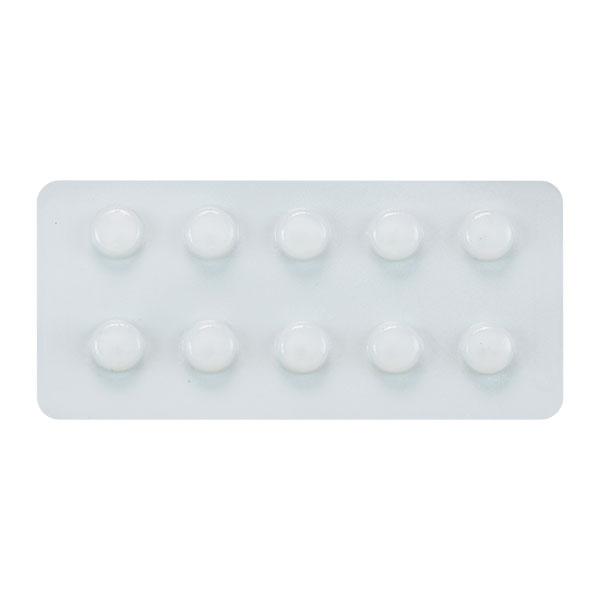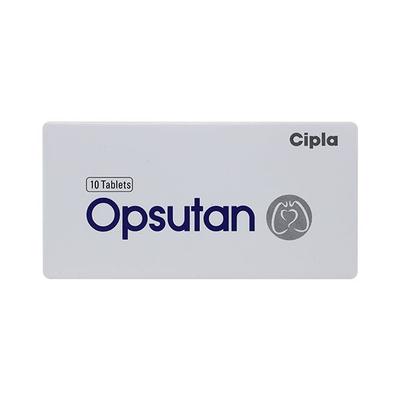

Netmeds First Membership
Quick Links
Introduction About OPSUTAN 10MG TABLET
OPSUTAN 10MG TABLET contains Macitentan which belongs to the group of medicines called Endothelin receptor antagonists. OPSUTAN 10MG TABLET is used alone/with other medicines to manage pulmonary hypertension in adults, which is a condition that occurs due to high blood pressure in pulmonary arteries (blood vessels that carry blood from heart to lungs).
OPSUTAN 10MG TABLET is not recommended for use in patients allergic to Macitentan, and/or soya. It is also not recommended for use in patients with liver disease or who have been tested with very high levels of liver enzymes in the blood.
Before taking OPSUTAN 10MG TABLET, inform your doctor if you have lung problems (such as pulmonary veno-occlusive disease), and/or kidney problems.
The most common side effects of taking OPSUTAN 10MG TABLET are anemia, headache, bronchitis (inflammation of the airways), edema (swelling of arms and feet), urinary tract infection, low blood pressure, and/or blocked nose. Consult your doctor if any of these symptoms worsen.
Uses Of OPSUTAN 10MG TABLET
- Manage pulmonary arterial hypertension in adults
How OPSUTAN 10MG TABLET Works
OPSUTAN 10MG TABLET works by blocking the action of endothelin hormone (chemical that cause vasoconstriction) which leads to relaxation and widening of blood vessel wall resulting in reduced pressure on the blood vessel wall and lower blood pressure thus managing pulmonary hypertension in affected individuals.
How to use OPSUTAN 10MG TABLET
Take OPSUTAN 10MG TABLET as advised by your physician. Swallow the medicine with a glass of water. Do not crush or chew the medicine. Your doctor will decide the correct dose and duration for you depending upon your age, body weight, and disease condition.
Side Effects Of OPSUTAN 10MG TABLET
Common
- anemia/reduced hemoglobin
- headache
- bronchitis (inflammation of the airways)
- nasopharyngitis (inflammation in the throat and nasal passages)
- edema (swelling of arms and feet)
- influenza (flu)
- urinary tract infection
- low blood pressure
- blocked nose
Rare
Stop taking OPSUTAN 10MG TABLET and contact your doctor immediately if you experience any of the following side effects:
- signs of allergic reaction such as swelling around the eyes, face, lips, tongue/throat, itching, and/or rash
- signs of impaired liver function such as nausea, vomiting, fever, stomach pain, yellowing of skin/whites of eyes, dark-colored urine, itching skin, unusual tiredness/exhaustion, flu-like condition (joint and muscle pain with fever)
- signs of pulmonary edema (wet lung) such as breathlessness, cough with frothy sputum, racing/pounding heartbeat
How To Manage Side Effects
Headache:
If OPSUTAN 10MG TABLET causes headache, then take rest and drink plenty of fluids. Try to avoid drinking alcohol. Ask your doctor to recommend a painkiller. Headaches should usually go away after the first week of taking OPSUTAN 10MG TABLET. If it lasts more than a week or becomes severe, then consult and inform your doctor.
Warning & Precautions
Pregnancy
OPSUTAN 10MG TABLET is generally not recommended for use during pregnancy and in women planning for pregnancy. Women of childbearing potential should use contraceptive measures and should consult doctor immediately if accidental pregnancy occurred while taking OPSUTAN 10MG TABLET since the medicine may cause harm to the unborn babies.
Breastfeeding
OPSUTAN 10MG TABLET is not recommended for use in breastfeeding women as it is not known whether the medicine may pass through breast milk. Consult your doctor before taking the medicine.
Driving and Using Machines
Do not drive or operate machines if you feel headache and/or low blood pressure after taking OPSUTAN 10MG TABLET.
Kidney
OPSUTAN 10MG TABLET should be used with caution in patients with kidney problems. Consult your doctor before taking OPSUTAN 10MG TABLET.
Liver
OPSUTAN 10MG TABLET is not recommended to use in patients with liver disease or who have been tested with very high levels of liver enzymes in the blood. Consult your doctor before taking OPSUTAN 10MG TABLET.
Allergy
Do not take OPSUTAN 10MG TABLET if you are allergic to Macitentan, soya, and/or any other ingredients of this medicine.
Lungs
OPSUTAN 10MG TABLET should be used with caution in patients with lung problems such as pulmonary veno-occlusive disease (obstruction of lung vein). Consult your doctor before taking the medicine.
Others
Before taking OPSUTAN 10MG TABLET, inform your doctor if you:
- are a man and planning to become father
Use in Pediatrics:
OPSUTAN 10MG TABLET is not recommended for use in children and adolescents (aged below 18 years). Consult your doctor before taking OPSUTAN 10MG TABLET.
Use in Geriatrics:
OPSUTAN 10MG TABLET should be used with caution in elderly patients (aged 65-years/above). Consult your doctor before taking OPSUTAN 10MG TABLET.
Interactions
A. Drug-Drug interactions:
Before taking OPSUTAN 10MG TABLET, inform your doctor if you are taking any of the following medicine:
- antibiotics (used to manage bacterial infections) Ex. rifampicin, clarithromycin, telithromycin, ciprofloxacin, erythromycin
- medicine used to manage seizures (Ex. phenytoin)
- medicine used to manage depression and epilepsy (Ex. carbamazepine)
- herbal medicines used to manage depression (Ex. St. John’s Wort)
- medicines used to manage HIV infections (Ex. ritonavir, saquinavir)
- medicines used to manage depression (Ex. nefazodone)
- medicines used to manage fungal infections (Ex. ketoconazole (except shampoo), fluconazole, voriconazole, miconazole, itraconazole)
- medicines used to control the heartbeat (Ex. amiodarone)
- medicine used to manage organ rejection after transplant (Ex. cyclosporine)
- medicines used to manage high blood pressure/specific heart problems (Ex. diltiazem, verapamil)
B. Drug-Food interaction:
Avoid taking piperine (used as a dietary supplement) while taking OPSUTAN 10MG TABLET as it may alter the effect of the medicine.
Overdosage:
If you or anyone else accidentally take too much of OPSUTAN 10MG TABLET, consult your doctor immediately or visit the nearby hospital. Symptoms of overdose are headache, nausea, and/or vomiting.
Synopsis
| Drug | : | Macitentan |
| Pharmacological Category | : | Endothelin receptor antagonists |
| Therapeutic Indication | : | Pulmonary arterial hypertension |
| Dosage Forms | : | Tablet |
More Information
- Keep OPSUTAN 10MG TABLET out of reach of children
- Do not store OPSUTAN 10MG TABLET above 30°C
FAQs About OPSUTAN 10MG TABLET
What is OPSUTAN 10MG TABLET used for?
OPSUTAN 10MG TABLET is used alone/with other medicines to manage pulmonary hypertension in adults, which is a condition that occurs due to high blood pressure in pulmonary arteries (blood vessels that carry blood from heart to lungs).
What are the common side effects of taking OPSUTAN 10MG TABLET?
The most common side effects of taking OPSUTAN 10MG TABLET are anemia, headache, bronchitis (inflammation of the airways), edema (swelling of arms and feet), urinary tract infection, low blood pressure, and/or blocked nose. Consult your doctor if any of these symptoms worsen.
How OPSUTAN 10MG TABLET works?
OPSUTAN 10MG TABLET works by blocking the action of endothelin hormone (chemical that cause vasoconstriction) which leads to relaxation and widening of blood vessel wall resulting in reduced pressure on the blood vessel wall and lower blood pressure thus managing pulmonary hypertension in affected individuals.
How OPSUTAN 10MG TABLET should be taken?
Take OPSUTAN 10MG TABLET as advised by your physician. Swallow the medicines with a glass of water. Do not crush or chew the medicine. Your physician will decide the correct dose and duration for you depending upon your age, body weight and disease condition.
Can OPSUTAN 10MG TABLET be used in pregnant women?
No, OPSUTAN 10MG TABLET is not recommended for use during pregnancy and in women planning for pregnancy. Women of childbearing potential should use contraceptive measures and should consult doctor immediately if accidental pregnancy occurs while taking OPSUTAN 10MG TABLET since the medicine may cause harm to the unborn babies.
References
1. Dustin R. Fraidenburg, Ankit A. Desai, and Jason X.-J. Yuan. Treatment of Pulmonary Arterial Hypertension. Goodman & Gilman’s: The Pharmacological basics of Therapeutics. 13th Edition. 2018. Page – 574-584.
2. Anjan Khadka, Dick B Singh Brashier, Anantharamu Tejus, Ashok Kumar Sharma. Macitentan: An important addition to the treatment of pulmonary arterial hypertension. NIH National Library of Medicine. National Center for Biotechnology Information. PMC PubMed Central. March 2015. [Accessed on 30th May 2022] https://www.ncbi.nlm.nih.gov/pmc/articles/PMC4319253/
3. Nicholas Rothbard, Abhinav Agrawal, Conrad Fischer, Arunabh Talwar, Sonu Sahni. Pulmonary arterial hypertension in the elderly: Clinical perspectives. NIH National Library of Medicine. National Center for Biotechnology Information. PMC PubMed Central. May 2020. [Accessed on 30th May 2022] https://www.ncbi.nlm.nih.gov/pmc/articles/PMC8016023/
4. Janssen Pharmaceutica NV. Electronic Medicines Compendium (EMC). [Revised in July 2022]. [Accessed on 30th May 2022] https://www.medicines.org.uk/emc/files/pil.5223.pdf
Useful Diagnostic Tests
- Echocardiogram










